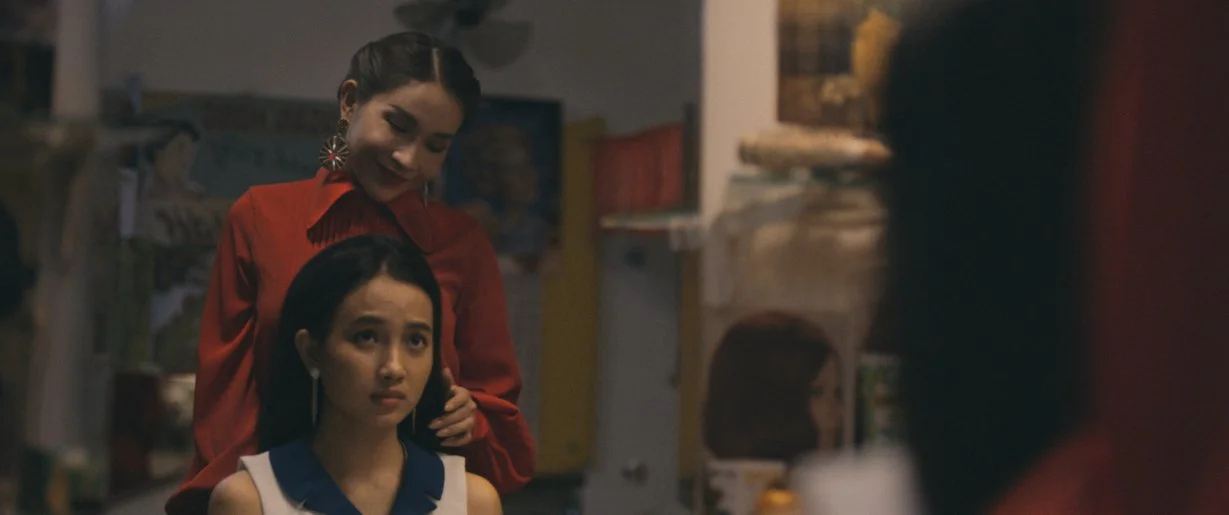The Horror!
Viet Nam adds to its burgeoning Asian horror hot spot cred with a three-part anthology based on urban legends.
Vietnamese Horror Story
Director: Trần Hữu Tấn • Writer: Trần Hữu Tấn
Starring: Vân Trang, Huỳnh Thanh Trực, Lê Bê La, Mạc Can, Nguyễn Ngọc Hiệp, Nguyễn Ngọc Hiệp, Nguyễn Hữu Tiến, Trần Khả Như, Huỳnh Như Đan, Tran Phong, Trịnh Tài, Xuân Phúc
Viet Nam • 1hrs 48mins
Opens Hong Kong July 28 • IIA
Grade: C
Viet Nam is having a horror moment. It’s nothing like the J-horror fad that swept across the globe a few years back, when Ju-On and Ring and Dark Water couldn’t get remade by Hollywood fast enough. But like Japan (pasty little boys), and South Korea (ghostly schoolgirls), and Thailand (ghostly spouses), and Hong Kong (hopping vampires), and Taiwan (possession) all have singular myths and legends that power their horror output, Viet Nam has its own, and the urban variety are what the blockbuster Vietnamese Horror Story (Chuyện ma gần nhà) is based on.
Vietnamese Horror Story follows a string of low-key entries in the genre that have been hits at home and earned some notice around the world in festivals and among horror afficionados. Bui Thac Chuyên’s Blood Curse (2012), Victor Vu’s Vengeful Heart (2014), and Minh Thang Ly’s Blind Shaman (2019) spring to mind, as do Trần Hữu Tấn’s Home Sweet Home (2019), which landed a spot in Busan in ’19, and Survive (2020), possibly Viet Nam’s first survival horror thriller. Producer Hoàng Quân had a hand in more than a few of those, turning his Production Q Creative House into a kind of a Blumhouse for Viet Nam. Well, Quân and Tấn are back together and this time they really struck gold. After Viet Nam’s cinemas reopened following – wait for it – COVID closures, the country’s horror buffs responded, and made Vietnamese Horror Story a hit. The film took in VND53 billion (US$2.3 million) at home in its opening weekend in February, becoming one of Viet Nam’s biggest domestic hits ever. Its release here follows bows in Singapore and Taiwan.
Vietnamese Horror Story presents three, possibly four, interconnected ghost stories in an anthology (again?), shared among five friends getting together for what has got to be the saddest hang ever (what is that food service?). The power goes out during a thunderstorm, so the group decides to pass the time telling spooky tales. Anyone who’s ever seen a horror movie knows no good can come of this. But the stories, drawn from local folklore, are the film’s strength. Too bad the rest of it is so poorly acted (with a few exceptions), so low production, and so not scary.
In part one, we learn about legendary silver screen beauty Lan Hương, recognisable for being on sugarcane juice carts, who vanished one day, only to be replaced in the hearts of movie-goers by the young Ái Như (comedian Khả Như). She takes budding actresses into her home – formerly Lan’s – to help shape them into the stars of tomorrow, and her current project is Ngọc Minh (Huỳnh Như Đan), who soon discovers Ai’s dirty little secret. In part two, a young magician, Đinh Phi (Huỳnh Thanh Trực), living with his father (Mạc Can) and an apartment block full of ghosts tries get out from under his father’s shadow. The final, and strongest, segment follows a psychic, Bích (Vân Trang) looking for a young woman who went missing years before. Her sister, Hằng (Ngọc Hiệp Nguyễn) assumes she’s dead, but wants a body to put to rest. This is old fashioned spirit antics: no generational trauma to explore, no shadows of the Vietnam/American War, depending on your geography. That’s refreshing, but it also makes for featherweight horror.
Make no mistake. This is cheap as shit. Locations are limited (perhaps as a way to keep the budget in check), as are actors with the kind of skill needed to pull off the nuance horror often demands. Như (who injects her preternaturally youthful actress with a creepy stillness), Trang (making the fine line between madness and communing with the next life even thinner) and Mạc (balancing doddering old dad with something a more sinister) buoy each part as the pro who’s called on to do the heavy lifting and make the kids looks less… unconvincing. But not even they can save a ramshackle, disjointed script that hangs too many story threads out to dry. Vietnamese viewers are likely to make connections and draw inferences the rest of us can’t – which is fine, not every genre piece needs deep knowledge to be enjoyable as a standalone – but like a decent comic or book adaptation, directors can’t speak exclusively to readers. The haphazard writing, muddled narrative and leaps in logic are alienating at best, laughable at worst. Tấn mines “old” Saigon colour and the sweltery atmosphere effectively where he can, and he’s clearly a horror fan, cribbing from highbrow influences (Pan’s Labyrinth) and low (Scary Stories to Tell in the Dark). Vietnamese Horror Story'‘s most notable achievement is getting away with some gore (it’s not Hostel, but baby steps) and getting past Viet Nam’s tetchy censors to exist at all. Watch it and come away with a hard won, “I remember the industry when…” Maybe. One day. — DEK



